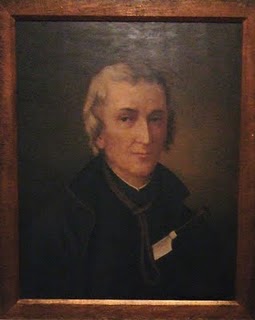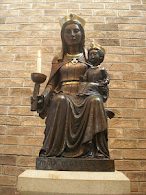In the 16th and 17th centuries, there were a number of plots associated with English Catholicism, some real an d some imaginary. Priests, especially the Jesuits, were usually blamed for being the masterminds of such plots. Against this background of paranoia and fear, it was easy, in the autumn of 1678, for Titus Oates and his followers to implicate the Jesuits in a fabricated plot to assassinate King Charles II and overthrow the Protestant Establishment.
d some imaginary. Priests, especially the Jesuits, were usually blamed for being the masterminds of such plots. Against this background of paranoia and fear, it was easy, in the autumn of 1678, for Titus Oates and his followers to implicate the Jesuits in a fabricated plot to assassinate King Charles II and overthrow the Protestant Establishment.
Titus Oates was born in 1649 in Oakham, Rutland. From a young age, it was said he had a deceitful nature and other faults and he was expelled from several schools. Despite this, he became a minister and served as curate to his father, Samuel Oates, a Church of England minister. This career ended disgracefully when he was imprisoned for his involvement in a conspiracy against a local man.
In 1677, supposedly a reformed character, Titus Oates was received into the Catholic Church. He was later to claim that his conversion was merely a ploy to infiltrate the Society of Jesus. He met the English Provincial of the Jesuits, Richard Strange, who arranged for him to go to the English College at Valladolid. Within a few months he was expelled. Using the alias Stampson Lucy, he then went to the Jesuits at St Omer. He was sent to Watten for an interview to assess his suitability for the Jesuit Novitiate. The Rector there was not favourably impressed and Oates returned to St Omer. It wasn’t long before he was expelled by the then Jesuit Provincial, Thomas Whitbread. Oates returned to London where he rejoined his friend, Israel Tonge, a crazed clergyman who believed that the Jesuits were responsible for the Great Fire of London in 1666. Tonge had always believed in the existence of a Popish Plot but no one of influence had ever believed him. Oates was encouraged by his friend and, consumed with hatred of the Jesuits, he concocted a detailed story of a plot to raise a rebellion, assassinate the King and place the King’s Catholic brother, James Duke of York, on the throne. This imaginary rebellion was to begin in Scotland and, of course, the Jesuits would be the leaders. Titus Oates set all of this down in 43 numbered paragraphs and through an intermediary, it was brought to the King’s attention. Great emphasis was placed on the articles referring to the assassination! Oates maintained that the English Jesuits were planning to assassinate Charles and that the Spanish Jesuits had contributed £10,000 to the cause.
The King, a Protestant whose life had been saved by Catholics and whose wife was Catholic, didn’t believe a word of the alleged plot. However, he instructed the Earl of Danby to investigate it. When news of the plot reached the public, the entire nation was gripped by a wave of fear and paranoia. The smouldering ashes of anti-Catholicism were fanned into a raging flame and the Jesuits bore the brunt of the hysteria. The Popish Plot persecutions began and continued until 1681. Twenty-four innocent Catholics, laymen and priests, lost their lives as a result of the Oates Plot. Twelve died in prison, three, hunted like animals, died from hardship and exposure, and nine, including former Jesuit Provincial, Thomas Whitbread, Oliver Plunkett, the Archbishop of Armagh, and the Last Welsh Martyr, St David Lewis, were executed.
What of Titus Oates? He became the most feted man in the country. He even received several Royal pensions. However, on 10th May 1684, Oates was arrested for referring to the Duke of York as “that traitor, James”. Found guilty, he was ordered to pay £100,000 damages. Unable to pay such an enormous fine, he was thrown into debtors’ prison. Oates was also charged with two counts of perjury with regard to his evidence against some of the alleged conspirators of the Popish Plot. In 1685, he was found guilty, fined 1,000 marks on each count of perjury and sentenced to life in prison. Judge George Jeffreys passed sentence, remarking, “When a person shall be convicted of such a foul and malicious perjury as the defendant is, I think it is impossible for the courts, as the law stands, to put punishment upon him in any way proportionable to the offence that has drawn after it so many horrid and dreadful consequences. We do therefore think fit to inflict an exemplary punishment upon this villainous, perjured wretch to terrify others for the future.” In handing down sentence, Sir Francis Wythens said, “I do not know how I can say but that the law is defective that such a one is not to be hanged.”
Nonetheless, in December 1688, Oates was released from prison and in March 1689, he petitioned Parliament for redress. In this he was unsuccessful and again remanded to prison. Alas, after much legal wrangling, King William of Orange pardoned Oates and granted him an allowance of £10 a Week! Oates never lost his hatred of Catholicism or the Jesuits and he spent the rest of his days writing anti-Jesuit articles. This vile little man, whom even the infamous Hanging Judge Jeffreys had called a “Shame on humanity”, died on 12th July 1705.
 d some imaginary. Priests, especially the Jesuits, were usually blamed for being the masterminds of such plots. Against this background of paranoia and fear, it was easy, in the autumn of 1678, for Titus Oates and his followers to implicate the Jesuits in a fabricated plot to assassinate King Charles II and overthrow the Protestant Establishment.
d some imaginary. Priests, especially the Jesuits, were usually blamed for being the masterminds of such plots. Against this background of paranoia and fear, it was easy, in the autumn of 1678, for Titus Oates and his followers to implicate the Jesuits in a fabricated plot to assassinate King Charles II and overthrow the Protestant Establishment.Titus Oates was born in 1649 in Oakham, Rutland. From a young age, it was said he had a deceitful nature and other faults and he was expelled from several schools. Despite this, he became a minister and served as curate to his father, Samuel Oates, a Church of England minister. This career ended disgracefully when he was imprisoned for his involvement in a conspiracy against a local man.
In 1677, supposedly a reformed character, Titus Oates was received into the Catholic Church. He was later to claim that his conversion was merely a ploy to infiltrate the Society of Jesus. He met the English Provincial of the Jesuits, Richard Strange, who arranged for him to go to the English College at Valladolid. Within a few months he was expelled. Using the alias Stampson Lucy, he then went to the Jesuits at St Omer. He was sent to Watten for an interview to assess his suitability for the Jesuit Novitiate. The Rector there was not favourably impressed and Oates returned to St Omer. It wasn’t long before he was expelled by the then Jesuit Provincial, Thomas Whitbread. Oates returned to London where he rejoined his friend, Israel Tonge, a crazed clergyman who believed that the Jesuits were responsible for the Great Fire of London in 1666. Tonge had always believed in the existence of a Popish Plot but no one of influence had ever believed him. Oates was encouraged by his friend and, consumed with hatred of the Jesuits, he concocted a detailed story of a plot to raise a rebellion, assassinate the King and place the King’s Catholic brother, James Duke of York, on the throne. This imaginary rebellion was to begin in Scotland and, of course, the Jesuits would be the leaders. Titus Oates set all of this down in 43 numbered paragraphs and through an intermediary, it was brought to the King’s attention. Great emphasis was placed on the articles referring to the assassination! Oates maintained that the English Jesuits were planning to assassinate Charles and that the Spanish Jesuits had contributed £10,000 to the cause.
The King, a Protestant whose life had been saved by Catholics and whose wife was Catholic, didn’t believe a word of the alleged plot. However, he instructed the Earl of Danby to investigate it. When news of the plot reached the public, the entire nation was gripped by a wave of fear and paranoia. The smouldering ashes of anti-Catholicism were fanned into a raging flame and the Jesuits bore the brunt of the hysteria. The Popish Plot persecutions began and continued until 1681. Twenty-four innocent Catholics, laymen and priests, lost their lives as a result of the Oates Plot. Twelve died in prison, three, hunted like animals, died from hardship and exposure, and nine, including former Jesuit Provincial, Thomas Whitbread, Oliver Plunkett, the Archbishop of Armagh, and the Last Welsh Martyr, St David Lewis, were executed.
What of Titus Oates? He became the most feted man in the country. He even received several Royal pensions. However, on 10th May 1684, Oates was arrested for referring to the Duke of York as “that traitor, James”. Found guilty, he was ordered to pay £100,000 damages. Unable to pay such an enormous fine, he was thrown into debtors’ prison. Oates was also charged with two counts of perjury with regard to his evidence against some of the alleged conspirators of the Popish Plot. In 1685, he was found guilty, fined 1,000 marks on each count of perjury and sentenced to life in prison. Judge George Jeffreys passed sentence, remarking, “When a person shall be convicted of such a foul and malicious perjury as the defendant is, I think it is impossible for the courts, as the law stands, to put punishment upon him in any way proportionable to the offence that has drawn after it so many horrid and dreadful consequences. We do therefore think fit to inflict an exemplary punishment upon this villainous, perjured wretch to terrify others for the future.” In handing down sentence, Sir Francis Wythens said, “I do not know how I can say but that the law is defective that such a one is not to be hanged.”
Nonetheless, in December 1688, Oates was released from prison and in March 1689, he petitioned Parliament for redress. In this he was unsuccessful and again remanded to prison. Alas, after much legal wrangling, King William of Orange pardoned Oates and granted him an allowance of £10 a Week! Oates never lost his hatred of Catholicism or the Jesuits and he spent the rest of his days writing anti-Jesuit articles. This vile little man, whom even the infamous Hanging Judge Jeffreys had called a “Shame on humanity”, died on 12th July 1705.








.JPG)

.JPG)






No comments:
Post a Comment